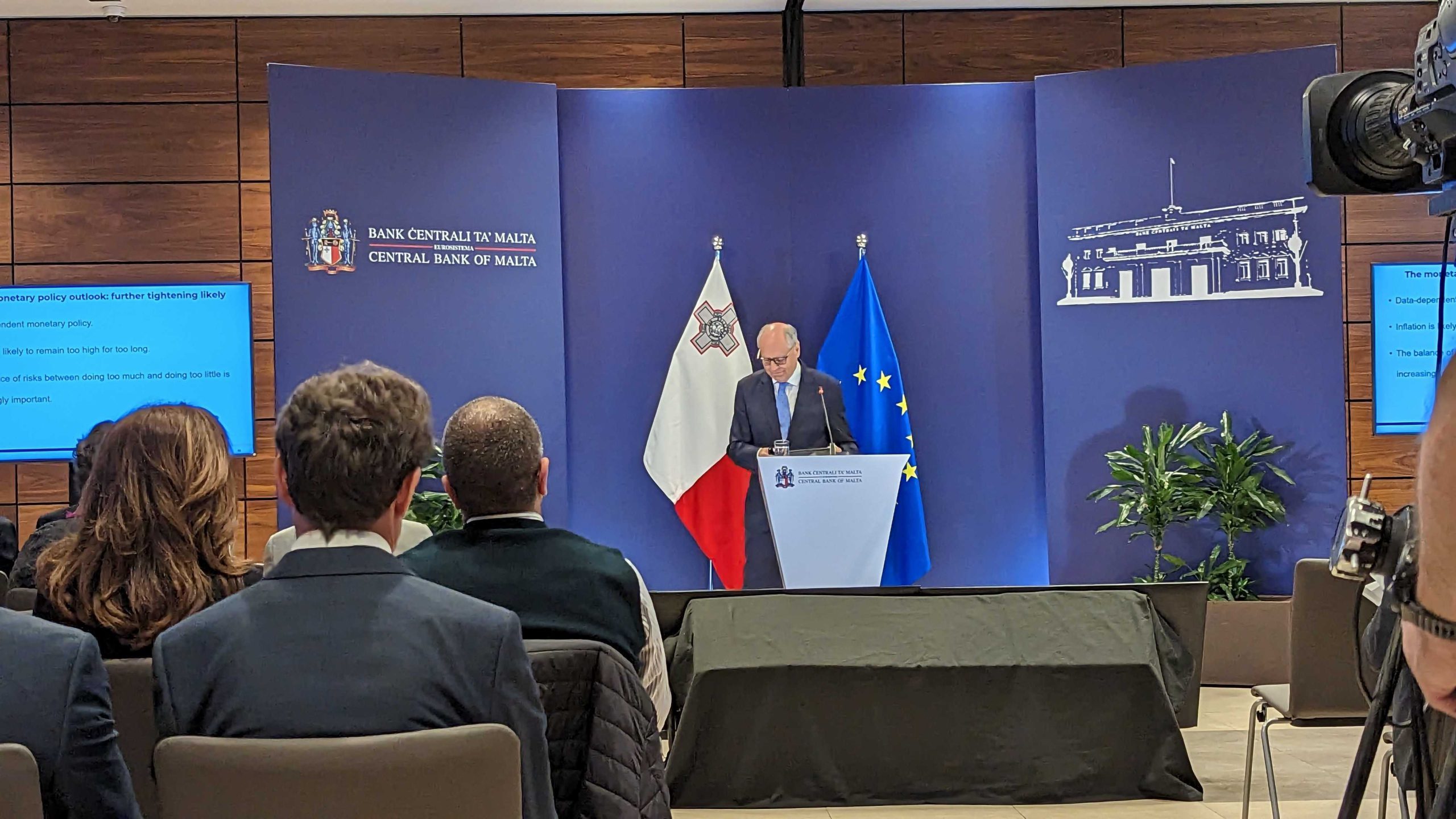All eyes were on inflation during the presentation of the Central Bank of Malta’s (CBM) annual report for 2022. However, an optimistic tone was struck in light of a highly resilient banking sector and strong economic growth forecast in the coming years.
The CBM released its annual report during a launch held at Binja Laparelli, Valletta on 20th April. The event was addressed by the CBM governor Edward Scicluna, deputy governor for monetary policy Alexander Demarco, deputy governor for financial stability Oliver Bonello and chief economist Aaron Grech.
The event started with a digital address by European Central Bank (ECB) president, Christine Lagarde, who commemorated the Central Bank on its 55th year anniversary.
Ms Lagarde remarked on the CBM’s pivotal role in Malta joining the European Union in 2004 and the eurozone in 2008.
She also took note of the words of the CBM’s coat of arms: “Fiducia Fortis – in confidence, strength”.
She recalled that since the CBM was established, the country’s GDP per capita grew twelvefold, with an average growth rate of 5.5 per cent per year. She also appreciated Malta’s support for the euro, which was the highest in the eurozone, according to latest Eurobarometer data.
“The phrase fiducia fortis will continue to shine just as strongly as it has in the past,” concluded Ms Lagarde.
Prof. Scicluna began his presentation by focusing on the high level of inflation.
He said that inflation in the eurozone peaked at 10.6 per cent during 2022. This was a result of heightened energy costs and rising food commodity prices brought on by geopolitical circumstances.
“Core inflation was 5.2 per cent at the end of December, and in February it went up to 5.6 per cent. We are awaiting that it will peak, and that it will be brought down,” alluded Prof. Scicluna.
Core inflation is the change in the cost of goods excluding, the food and energy sector.
He described the ECB Governing Council’s decision to raise interest rates by 250 basis points in 2022 and a further 150 basis points in 2023 as “firm”.
It was explained that the ECB’s mandate is to achieve price stability, and to bring down inflation to around two per cent.
In light of the ECB’s rising interest rates, he expressed appreciation for the local bank’s commitment not to raise interest rates.
Prof. Scicluna said that although inflation in the euro area has peaked, it is still too high, and therefore further fiscal tightening is expected.
“We need to do more to tackle inflation, one must remain vigilant,” he concluded.
The CBM projects that inflation will remain high in 2023 but will moderate to just above two per cent by 2024.
Inflation reached significantly high levels during 2022, however upward pressure was damped due to the Government’s intervention in the energy and fuel market, having decided to stabilise prices through extensive subsidies.
In response to a question on whether what happened with Credit Suisse and the collapse of multiple banks in the USA has led to the ECB to increase oversight, Prof. Scicluna responded, “It is significant that it did not happen in the Eurozone.”
“In US, it is very particular, there was [regulatory] liberalising during the Trump years, however the EU has been religious in following the Basel pillars” explained the governor.
Basel pillars are a set of international banking regulations created to establish an international standard of how much capital banks must keep in reserve in order to meet their obligations.
Commenting further on the situation surrounding Credit Suisse, he said that the ECB Governing Council was discussing the situation the very day it happened.
“We were very pleased that they [Swiss Government] acted fast, however, they cut corners,” making note of the fact there are a growing number of reports of the bank’s shareholders are suing the Swiss Government.
“We were very disappointed at the Swiss Government for hitting bondholders first” said Prof. Scicluna, who had said that it is shareholders who should shoulder the burden.
The bank’s chief economist Aaron Grech gave an account of Malta’s economic growth, which he said started moderating in 2022 following a strong recovery from the effects of the COVID-19 pandemic in 2021. This was aided by strong domestic demand, which remained resilient due to households having developed ample savings during the pandemic.
Looking closer at the country’s trade balance, he said, “headline net exports fell, but imports increased, indicating a surge in investment.”
With regard to employment, he noted that the rate of employment in Malta was well above that of the rest of the eurozone. This was further highlighted by Malta’s labour tightness which today exceeds that of 2019.
“The unemployment rate fell below three per cent in 2022.”
To meet the demand for workers the country has sustained a strong level of immigration, however, it became apparent that, “the share of third country nationals is starting to become larger than that of EU nationals, and it is not due to the UK leaving the EU.”
With regard to inflation, he noted that it is largely imported.
“Food inflation is quite substantial, but still below the EU average,” remarked Dr Grech, whereas inflation in the cost of services was more pronounced, due to the labour shortage driving up wages.
Dr Grech also noted that restaurants have also become more expensive. In addition to rising labour costs and food inflation, he remarked that prices were driven up due to a strong recovery in the tourism sector and buoyant domestic demand.
As a result of the Government’s decision to subsidise energy prices, it did play a role in increasing national inflation as it did elsewhere across Europe.
Energy prices across Europe are however expected to fall. Mr Grech noted that this will lead to Malta having a higher rate of inflation than a number of eurozone countries, but this will still benefit Malta, since it will ease pressure on the Government’s subsidy programme stabilising energy prices.
Deputy governor Mr Bonello focused on developments in the banking sector, where he emphasised the continued resilience of the system, which operates with ample liquidity and strong capital buffers. He noted that while asset quality and profitability improved, cyclical vulnerabilities persist. However, he assured that these are being addressed by appropriate macroprudential policy measures.
Despite the turmoil in the global banking system witnessed in the USA and Switzerland, Mr Bonello noted that, “Malta’s banks have been relatively unscathed.”
He explained that Malta’s banks have very strong liquidity coverage and that the number of non-performing loans have reached their lowest level in years.
During his presentation, deputy governor Mr Demarco reiterated the CBM’s commitment to price stability. He explained that, as a result of the ECB’s rising interest rates, the CBM, similar to most other central banks in the Eurosystem, experienced a contraction in their balance sheets.
The full report can be found here.
Self-employed, employees and companies contribute €2.1 billion in 2023
Parliamentary data reveals five-year growth trends in fiscal contributions
MFSA concludes review of Crypto-Asset Service Providers following MiCA implementation
The Authority provided clear expectations and guidance to address certain concerns.
Malta Development Bank to launch schemes supporting sustainable development and creative sector
In 2024, the MDB launched the SME Guarantee Scheme and the Guaranteed Co-Lending Scheme






